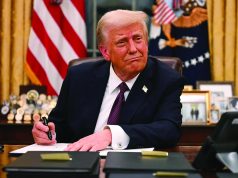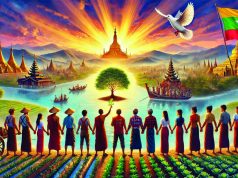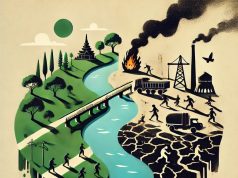Democracy is a system of government by the whole population or all the eligible members of a state, typically through elected representatives. That system is what Myanmar has practiced for the ten years from 2011 t0 2020, until the voters’ fraud by NLD government in 2020 elections.
Yet we all should not forget what the famous Socrates said about democracy and got executed for speaking up. Socrates believed that democracy was not as good as it appeared and had several arguments against it, including:
I. Voting requires skill and wisdom
Socrates believed that voting, whether directly or for representatives, requires a skill and wisdom that not everyone has. He argued that giving people without the skill the ability to vote could lead to societal shipwreck.
II. Demagoguery
Socrates believed that people seeking election could exploit our desire for easy answers. He believed that democracy would lead to demagoguery, which is political activity that seeks support by appealing to the desires and prejudices of ordinary people rather than by using rational argument.
Not forgetting the simple words of wisdom from Lee Kuan Yew; “People tend to elect their leaders based on how well they talk and how good they look on TV. The result has always been disastrous for the voters”.
In essence, democracy system has the habit of choosing the wrong leaders, especially if the populace is not competent or educated enough to make the right choice.
Experience of past ten years
Experience of the past ten years in Myanmar has been the proof of that. President Thein Sein administration was always viewed with slight derision for being not really a democratic government. When people had a chance to select via a so-called in a democratic way, they selected Su Kyi and her compatriots, who are adept at none, but talking.
As the 900 years old knight said in the Indiana Jones and the Last Crusade, “You must choose, but choose wisely. For as the true grail will bring you life but the false grail will take it away.” Hindsight is 20-20, but looking back, no rational being would say Myanmar chose wisely in 2015.
Economy performed worse under Su Kyi. No significant infrastructure projects was undertaken. Inflation was higher. Currency depreciated more. Their time was spent wholeheartedly on attacking the military, defunding the previously approved projects or doing nonsensical projects such as Welcome to XXX signages across every little towns and cities. Businessmen and elders talked about how the country would have changed so much for the better had President Thein Sein had a chance to govern for the next five years. But then, this is democracy.
Western model vs Eastern models
The western model of democracy relies on reasonably wise and educated populace, who combined together would have an increased chance of selecting the suitable and qualified candidates. (Other than Trump perhaps). Plus the countries are already enriched through two centuries of colonialism, exploiting resources of their colonies such as India and Myanmar,while boosting their national incomes and the wealth of their citizens. Their citizens do not have to worry about basic daily survival. Their children welfare are well taken care of by the government.
Most of the countries of the east do not have such luxury. China rose out of the ashes of the infamous famine, due to its program of the great leap backwards and cultural revolutions. Vietnam got to its hyper growth mode today pushing its luck after three consecutive rounds of invasion by colonial powerhouses. Singapore has reached first world stage through the tough love imposed by its founder, depriving all its citizens of what Europeans called ‘basic human rights’. How can their systems of governments be measured by yardsticks of the West. These three just provided evidence that countries in Asia can reach first world level of development, without colonising other countries and following their own system of governance.
Necessities
For democracies to succeed, certain base lines or minimum standards are necessary. E.g., the majority of the population should have a some minimum income and education levels. That would ensure that when the majority prevails in a democracy, it is the intelligent majority who prevail and not the village idiots who want to bomb the country away.
A well-read and educated population would see to the fact that their future generation focus on development and not encourage them to go into the jungle to maim themselves and become disabled. In the absence of such requisites, could it be possible for Myanmar to prosper under a democratic system of government?
The issue of leadership
Leaders are born, not made. Quoting LKY again, he had said, “I have never heard of someone who has become a great leader, after attending a leadership course”. The systems in China, Singapore and Vietnam work due to great or at least, good leadership.
If you study these countries, you will see leaders who are incorruptible, leaders who are resolute in punishing corrupt practices, leaders who put the right people in the right place, leaders who are not afraid in an international arena and leaders who believe that the next generation of potential leaders love the country as much as they do and would give them chances to grow up and lead the country.
Leaders are not gods. They do not know all (unless you are Kim Jong Un or Il). When they surround themselves with advisory panels, the panelists should be well verse in the ways of the modern world and at an international level. Having panelists with the average age of 70+ would not do the country any good. Older may be wiser, but they would also be slower and be more cheugy than the younger counterparts. Plus they are more likely to be ‘Yes’ men, in order to avoid confrontation and challenges. How would the country move forward under such circumstances?
The issue of ageism in leadership is directly relating to the promotion of younger and more capable individuals into position of leaders. When youth are given chances, the leaders can handpick them later on, as their performance would have been observed by then. This is where our Myanmar is out of step with the fast developing economies in the neighbourhood. Based on OECD report of 2023 the average age of cabinet members stood at 53 among OECD countries. Myanmar cabinet has advanced golden oldies with an average age of 65.
You can see better contrast within ASEAN. The average age of Singapore cabinet ministers now is 52, a thirteen years knock off from the previous generation average age of 65. With the Thailand’s PM reaching the ripe old age of 38, the average age there is likely to be even younger.
Law and order
Finally, the issue of law and order. Regardless of the system of government we follow, maintaining law and order is the epitome of good governance. China, Singapore or Vietnam would have limited many human rights by Western standards, but they are respected due to their strict law and order regimes.
We should be prepared to publicise the crimes, corrupt practices and the punishment too. Recently, a video clip was uploaded showing youths less than 18, being executed for rape in the self administrative state of Wa in the eastern Shan state. We do not hear any form of complaints from leaders of the so called democratic world, or HRW or UN agencies or NGOs. At least, the Wa state sent a signal to the rest of the world that lawlessness would not be tolerated in their lands.
Once we have proper law and order and publicised punishments, it would be easier to rid ourselves of nepotism, cronyism, favouritism, plutocracy and kleptocracy.
If not democracy, what would be best then?
The issue is not about deciding what is the best, but following each country’s unique path to development to ensure it can stand tall among the international crowd. Add the spices of a good education system, good leadership, governing opportunities for youth and enforcement of law and order, Myanmar could be there in no time to stand abreast of its neighbours. Only thereafter, Myanmar people would not only dream about the vestiges of the past glorious kingdoms, but also become leaders and professionals in reality in the foreseeable future.










